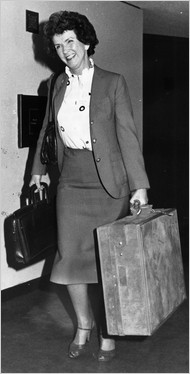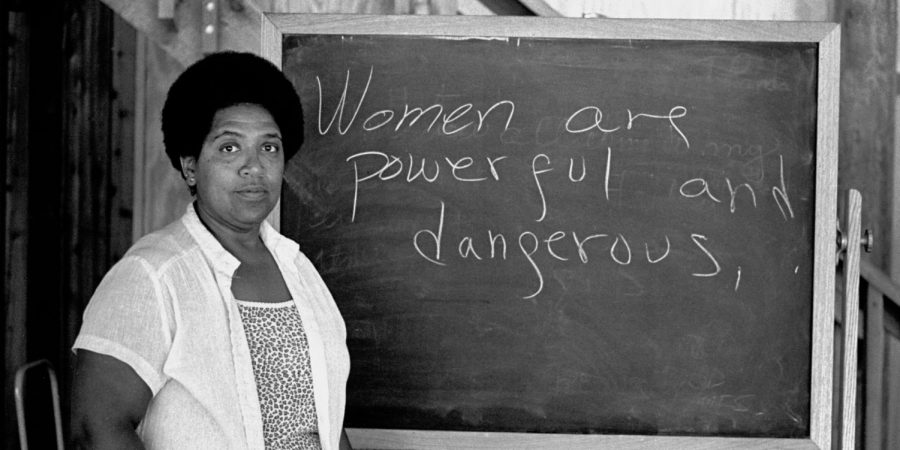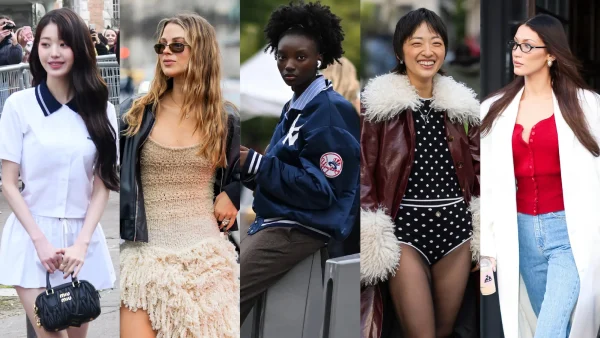What Feminism Means to the Students of Berkley
1983: Caribbean-American writer, poet and activist Audre Lorde.
There are so many components to the history of women within our country. For centuries, women and men alike have worked tirelessly towards achieving equal rights for women. This effort is now formally known as feminism. The agenda of this movement is certainly up for interpretation. Many people have differing views and opinions about the movement’s purpose. Throughout several decades, there have been equally as many proponents as there have been opponents of the cause. This is still true in 2021, and Berkley’s student’s opinions on the matter exemplify this divide.
In honor of Women’s History Month, I decided to ask a few students about their opinions on feminism. Each student was asked: Are you a feminist? Why or why not? Does being labeled a feminist scare you? What do you think the main goal of the feminist movement is? What does the word feminism mean to you? And finally, What specific attribute of the generalized “feminist agenda” (i.e inclusiveness, equal opportunity, sexual expression, and the abolishment of sexism) do you notice within our Berkley community? And in which ways do these ideas manifest into our school system? Their responses highlighted the many downfalls of the movement: lack of inclusivity, its perceived intimidating nature, and its political connotations. Others highlighted its positive effects such as achieving more equality in certain sectors of society, and empowering women. These students have requested to remain anonymous in order to keep the focus on their messages, instead of who’s saying them.
Student A said: “Yes I am a feminist. I am a feminist because I think there is still a problem when it comes to women’s rights and that change needs to be made in society. I am fine with being labeled a feminist. It think the main goal of the feminist movement is to spread as much awareness about sexism as we can, and to challenge the systemic inequalities women face on a daily basis. Something I noticed within Berkley is things like dress code, and how it is presented mostly towards girls.”

This student addressed something very important in mentioning the “systematic inequalities” that women are faced with. Many don’t realize that sexism is a form of systematic oppression (www.thoughtco.com). It is not an issue that can be solved by a change in attitudes and behaviors alone. Sexism is the perpetuation of domination and oppression of women, and this can sometimes be an unconscious act. Thus to achieve equality, it is essential to look at inequality on a larger scale, and address the ways in which it is embedded in the foundation of our society.
Student B: “I would call myself a feminist, but there also other movements I’m interested in, like I’ve heard some call themselves a “womanist,” so before I use a label I would definitely have to do my research and see which term fits me the most. Also, feminism was originally created for white women, and it wasn’t inclusive of everyone. But the movement has definitely changed. I would definitely need to do research first. Being labeled in general is not necessarily something I like, but I am not afraid of that label at all. I think feminism’s main goal is to empower, strengthen, and build for the next generation.”
“Overall, it breaks down harmful ideologies, brings accountability, and dismantles the patriarchy. To me feminism means the empowerment of women, and building opportunities for me not to be afraid, to not have to lessen myself around men and to achieve equality. At Berkley, I enjoy that we don’t have a dress code. I think that expression is important, and I’m happy that it isn’t limited at school.”
One great point that this student brought up was that the feminist movement has not always been inclusive. The first wave of feminism took place throughout the nineteenth century and the early twentieth century. Its main focus was to create more opportunities for women. However, the movement took place during the cusp of the 13th amendment’s enactment, and Black women were completely excluded from it.
However, this was soon eradicated when one the forerunners of feminism, Sojourner Truth emerged. Her will gave way to the formation of Black feminism (nmaahc.si.edu). Although this movement is, in essence, a feminist movement, it is vastly different from the “broader sphere” of feminism. It embraces struggles that are specific to Black women in America, such as racism and classism. These are things that cannot resonate with all feminists on a larger scale; therefore, Black feminism gives rise to the empowerment of Black women. It is the job of all feminists to empower all women, no matter their race, sexuality, or identifications. As Sojourner Truth once effortlessly said, “ain’t I a woman?” But in duality with this, feminism needs to be a layered community because everyone’s struggles are different.
Student C said: “I am a feminist because I believe in gender equality. Being labeled as a feminist doesn’t scare me, but it does have a negative connotation. Many people believe feminists are only women who think they are better than men, and that men deserve less, but that is simply not the case. Being a feminist is wanting equality for everyone, and believing that women should have equal opportunities to their male counterparts. The main goal of the feminist movement is to achieve gender equality, and erase gender prejudice. To me, feminism is standing up for women and all people, and creating a world with equal opportunities.”
“As far as the Berkley School District, I’m not sure that I see much action put forth to push the feminist agenda. Honestly, I think our school could do more to improve on this. There is so much negative light shone on the feminist movement, and helping our students, teachers, staff, and parents to learn more about this is necessary to create a more welcoming and open community.”
This student touched on the misconception that is commonly held about the feminist movement which is that feminists want more rights as opposed to equal rights. Throughout history, many people have had the tendency to label feminists as unladylike, angry, lesbian, man-hating, or all of the above (www.bbc.com). These labels exemplify the harsh judgment women receive when they break traditional gender roles by being more outspoken and independent. Many times this defiance correlates to people feeling threatened. When people hold the view that women are out to take things from men such as positions that are commonly held by men, or duties that normally fall on men, this can be seen as an overstepping (www.bbc.co.uk). However, the fact that these boundaries (roles which are conventionally filled by men) exist, proves that women are not given equal opportunities. This substantiates the notion that our society is structured such that men have privilege over women. Therefore, when women attempt to fulfill these roles, it is not a demonstration of women wanting more than equal rights, it is just that they want more than they are allotted.
Student D said: “No I am not a feminist. Being labeled a feminist does not scare me, feminism is there to push the Democrats agenda, and the movement that was good until women could vote.”
This student brought up their views about the correlation between feminism and “the Democrats’ agenda.” And it is actually a very commonly held belief that feminism is mainly a Democratic belief, which is true, to an extent (www.pewresearch.org). Until the 1970’s, there was little to no polarization between political parties on the topic of feminism (www.politico.com).

One story that highlights the transition from feminism as a neutral issue to a politically charged belief is Mary Dant Crisp’s, a former co-chairman of the Republican National Committee. Crisp was an outspoken feminist who supported pro-choice, and workplace equality for women. At this time, these beliefs had no inherent relation to Republican or Democratic platform. However, after the Equal Rights Amendment was ratified in 1976–with little resistance from the Republicans–Crisp began to notice a surge in anti feminist support within the Republican party. She lost a lot of supporters, and eventually resigned in response to the firing of Bella Abzug after she criticized Carter’s tax cuts. As the Republican party became more and more anti feminist, Crisp no longer knew her place in politics. Conversely, the Democratic party began to embrace the feminist agenda and gave sanction to views of equal wage, voting rights, prohibition of sexual assault and harassment, and pro-choice. These values have proven to help the Democratic party win the support of women, as seen during Trump’s presidency with his approval rating among women hitting a low of 37% in 2019 (thehill.com).
There were many other great responses that I certainly would have included had I thought that our readers would be interested in a five-page essay about feminism. Nevertheless, it was quite interesting to think about the many ways in which the existence of feminism affects different people for different reasons. Although it can be disheartening to think of all the ways in which the movement can improve, it is just as redeeming to hear young men and women talk about how the movement empowers them. It is important for everyone to feel supported, and realizing our shared goals makes it easy for us to come together and support one another. It can be concluded from what many of these students said, that here at Berkley we create a space that encourages and enables expression which plays a huge role in empowerment.
However, there is also always room for improvement. For example, another student mentioned in their interview that Berkley could do a better job at incorporating more female philosophers, scientists, mathematicians, and writers into our curriculum. This can also be seen within the movement itself. There are always ways in which people can be more inclusive, and approach feminism in a way that is not politically charged. At the end of the day, the lives of all women matter, and women’s lives are human lives, so the importance of civil rights and equality should not have to vary based on political beliefs.

Hello everybody:) my name is Raynah Jacobs. I have had the pleasure of being on the Berkley Writing for Publication staff for Four years now....







